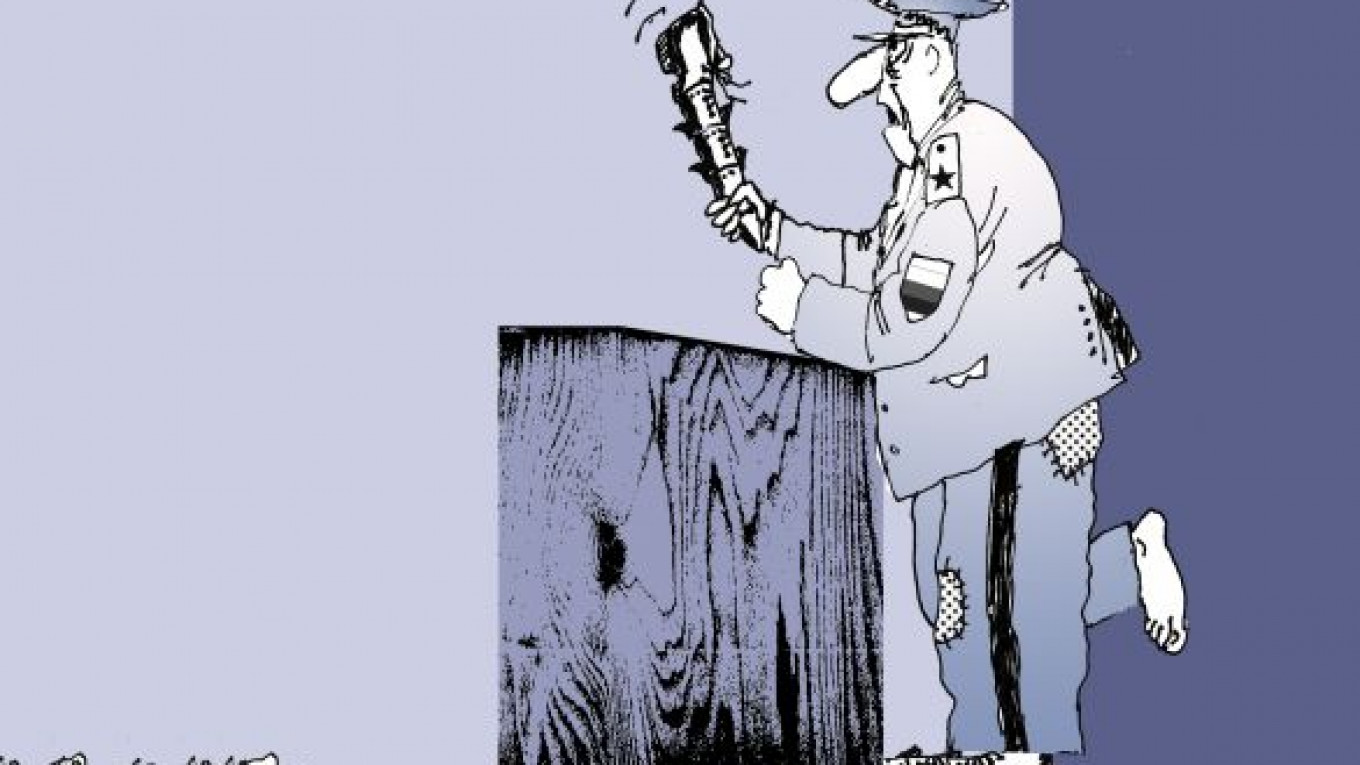On every Victory Day for the last decade, the Kremlin has tried to convince Russians and the world as a whole that Russia is a major military power. Moscow drivers are repeatedly trapped for hours in traffic jams caused by the military parade rehearsals. The state media urged people to show a little patience in honor of the country's Great Patriotic War victory over the fascist aggressors. After all, they argued, this is a matter of Russia's glory and international standing — as if battalions of goose-stepping soldiers and columns of armored vehicles with missiles produced 30 years ago are essential to a revival of national pride.
Apparently, there is not enough national pride left over to provide thousands of Great Patriotic War veterans housing, despite the public promises to do so. Brave men and women to whom Russia owes its very existence after they defended the Soviet Union against the Nazis still live in dilapidated shacks without central heating, running water or indoor toilets.
Instead, Russia's leaders take great pride over the country's huge nuclear arsenal that is capable of destroying the United States. At least, that was the message delivered at an international conference on missile defense held by the Defense Ministry last week. During the conference, Deputy Chief of the General Staff Valery Gerasimov gave a computer-model presentation in which Russian intercontinental missiles were launched from bases in the Kaluga, Saratov and Ivanovo regions for New York and Los Angeles. But Gerasimov showed in the video simulation how most were intercepted by a powerful U.S. missile defense system.
Such presentations offer little to further Russia's dialogue with the West. The only thing they do reveal is how top political and military leaders think. To engage in a serious debate on whether U.S. missile defense undermines Russia's nuclear deterrence, Russia should first make public the data on which it bases its calculations. After all, Moscow and NATO have very divergent estimates of the capabilities the European-based missile shield would possess by 2020.
Incidentally, Russia had several opportunities to receive objective technical information on missile defense capabilities, including visiting U.S. missile defense sites and observing interceptor tests against missiles. Russia never responded to that proposal. It seems that the main reason it rejected the U.S. offer was that this would have hindered it from achieving its real goal: the creation of computer models proving how powerful the U.S. missile defense system is and how it could cripple Russia's strategic nuclear forces.
But the arguments presented by Russian officials do not hold water. When discussions focused on the United States intercepting Russian missiles over its own territory, Moscow did not bother to consider the fact that Washington plans to deploy only 40 U.S.-based GBI interceptor missiles. Every incoming Russian warhead would be surrounded by a barrage of decoys, and most independent military experts and scientists claim that it would take at least 10 interceptors to destroy a single warhead. That means the United States would be able to stop no more than four incoming Russian warheads. Similarly, Russian experts have greatly exaggerated the capabilities of the missile defense systems to be deployed in Poland and Romania to the point where they claim those installations can protect all of Europe.
In addition, General Staff chief Nikolai Makarov has said nuclear deterrence is the best method available today for maintaining international security. In other words, the only thing keeping Moscow and Washington in check is nuclear deterrence and mutually assured destruction. Until recently, Russian leaders have also said these principles are relics of the Cold War. Once again, they are embracing these Cold War principles and policies openly.
Moreover, Makarov announced during last week's missile defense conference that Russia may launch a preemptive strike against missile defense installations in Europe if the country's national security is undermined. In effect, Moscow is apparently not concerned that such a move would start a war against the United States and NATO.
Such bellicose blustering inevitably calls to mind the time Soviet leader Nikita Khrushchev banged his shoe in anger during a meeting of the United Nations General Assembly. The only difference this time is that Moscow is banging a computer model instead of a shoe.
Alexander Golts is deputy editor of the online newspaper Yezhednevny Zhurnal.
A Message from The Moscow Times:
Dear readers,
We are facing unprecedented challenges. Russia's Prosecutor General's Office has designated The Moscow Times as an "undesirable" organization, criminalizing our work and putting our staff at risk of prosecution. This follows our earlier unjust labeling as a "foreign agent."
These actions are direct attempts to silence independent journalism in Russia. The authorities claim our work "discredits the decisions of the Russian leadership." We see things differently: we strive to provide accurate, unbiased reporting on Russia.
We, the journalists of The Moscow Times, refuse to be silenced. But to continue our work, we need your help.
Your support, no matter how small, makes a world of difference. If you can, please support us monthly starting from just $2. It's quick to set up, and every contribution makes a significant impact.
By supporting The Moscow Times, you're defending open, independent journalism in the face of repression. Thank you for standing with us.
Remind me later.







